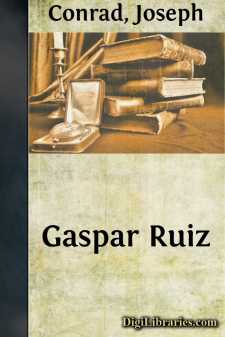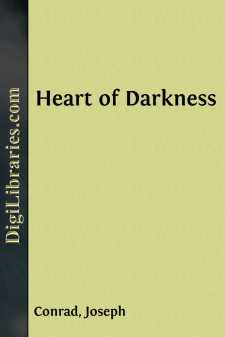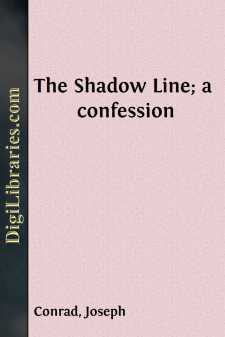Categories
- Antiques & Collectibles 13
- Architecture 36
- Art 48
- Bibles 22
- Biography & Autobiography 813
- Body, Mind & Spirit 142
- Business & Economics 28
- Children's Books 17
- Children's Fiction 14
- Computers 4
- Cooking 94
- Crafts & Hobbies 4
- Drama 346
- Education 46
- Family & Relationships 57
- Fiction 11829
- Games 19
- Gardening 17
- Health & Fitness 34
- History 1377
- House & Home 1
- Humor 147
- Juvenile Fiction 1873
- Juvenile Nonfiction 202
- Language Arts & Disciplines 88
- Law 16
- Literary Collections 686
- Literary Criticism 179
- Mathematics 13
- Medical 41
- Music 40
- Nature 179
- Non-Classifiable 1768
- Performing Arts 7
- Periodicals 1453
- Philosophy 64
- Photography 2
- Poetry 896
- Political Science 203
- Psychology 42
- Reference 154
- Religion 513
- Science 126
- Self-Help 84
- Social Science 81
- Sports & Recreation 34
- Study Aids 3
- Technology & Engineering 59
- Transportation 23
- Travel 463
- True Crime 29
Joseph Conrad
Joseph Conrad, born Józef Teodor Konrad Korzeniowski in 1857 in Poland, was a prominent British novelist known for his rich narrative style and profound exploration of the human psyche. His most famous works, such as "Heart of Darkness" and "Lord Jim," delve into themes of colonialism, morality, and existentialism. Despite English being his third language, Conrad's mastery of the language and innovative literary techniques have cemented his legacy as a central figure in modern literature.
Author's Books:
Sort by:
by:
Joseph Conrad
On my right hand there were lines of fishing stakes resembling a mysterious system of half-submerged bamboo fences, incomprehensible in its division of the domain of tropical fishes, and crazy of aspect as if abandoned forever by some nomad tribe of fishermen now gone to the other end of the ocean; for there was no sign of human habitation as far as the eye could reach. To the left a group of barren...
more...
by:
Joseph Conrad
I A Revolutionary war raises many strange characters out of the obscurity which is the common lot of humble lives in an undisturbed state of society. Certain individualities grow into fame through their vices and their virtues, or simply by their actions, which may have a temporary importance; and then they become forgotten. The names of a few leaders alone survive the end of armed strife and are...
more...
by:
Joseph Conrad
PART I. THE MAN AND THE BRIG The shallow sea that foams and murmurs on the shores of the thousand islands, big and little, which make up the Malay Archipelago has been for centuries the scene of adventurous undertakings. The vices and the virtues of four nations have been displayed in the conquest of that region that even to this day has not been robbed of all the mystery and romance of its past—and...
more...
by:
Joseph Conrad
THE WARRIOR'S SOUL(1917) The old officer with long white moustaches gave rein to his indignation. "Is it possible that you youngsters should have no more sense than that! Some of you had better wipe the milk off your upper lip before you start to pass judgment on the few poor stragglers of a generation which has done and suffered not a little in its time." His hearers having expressed much...
more...
by:
Joseph Conrad
I Napoleon the First, whose career had the quality of a duel against the whole of Europe, disliked duelling between the officers of his army. The great military emperor was not a swashbuckler, and had little respect for tradition. Nevertheless, a story of duelling which became a legend in the army runs through the epic of imperial wars. To the surprise and admiration of their fellows, two officers,...
more...
by:
Joseph Conrad
I The Nellie, a cruising yawl, swung to her anchor without a flutter of the sails, and was at rest. The flood had made, the wind was nearly calm, and being bound down the river, the only thing for it was to come to and wait for the turn of the tide. The sea-reach of the Thames stretched before us like the beginning of an interminable waterway. In the offing the sea and the sky were welded together...
more...
by:
Joseph Conrad
ALMAYER'S FOLLY I am informed that in criticizing that literature which preys on strange people and prowls in far-off countries, under the shade of palms, in the unsheltered glare of sunbeaten beaches, amongst honest cannibals and the more sophisticated pioneers of our glorious virtues, a lady—distinguished in the world of letters—summed up her disapproval of it by saying that the tales it...
more...
by:
Joseph Conrad
I. “I have not read this author’s books, and if I have read them I have forgotten what they were about.” These words are reported as having been uttered in our midst not a hundred years ago, publicly, from the seat of justice, by a civic magistrate. The words of our municipal rulers have a solemnity and importance far above the words of other mortals, because our municipal rulers more than any...
more...
by:
Joseph Conrad
CHAPTER 1 He was an inch, perhaps two, under six feet, powerfully built, and he advanced straight at you with a slight stoop of the shoulders, head forward, and a fixed from-under stare which made you think of a charging bull. His voice was deep, loud, and his manner displayed a kind of dogged self-assertion which had nothing aggressive in it. It seemed a necessity, and it was directed apparently as...
more...
by:
Joseph Conrad
I Only the young have such moments. I don't mean the very young. No. The very young have, properly speaking, no moments. It is the privilege of early youth to live in advance of its days in all the beautiful continuity of hope which knows no pauses and no introspection. One closes behind one the little gate of mere boyishness—and enters an enchanted garden. Its very shades glow with promise....
more...











